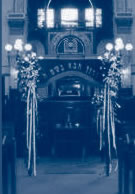|
SEDRA : Beshalach - Shira: Hertz Chumash
p. 265 Exodus Chap. 13 v. 17
This week's Sedra is generously sponsored by Morris Ritz.
SYNOPSIS:
When the Israelites left Egypt, G-d did not lead them to
Canaan by the direct route through the land of the Philistines,
lest they encounter hostile armies there and come to regret
their departure. Instead, the people journeyed in the direction
of the wilderness led by a pillar of cloud by day and a pillar
of fire by night. Moses did not forget to take the remains
of Joseph with him, as Joseph had been promised. The Israelites
had reached Etham on the edge of the wilderness when they
were commanded to turn back and camp by the Red Sea. There,
Pharaoh would pursue them, thinking they were trapped in the
wilderness, but G-d would again provide their salvation.
As soon as the Israelites had left, Pharaoh regretted letting
them go. He assembled his whole army, which consisted of many
soldiers and chariots, and pursued the Israelites. The Egyptians
were soon at the heels of the Israelites who panicked and
complained bitterly to Moses. "It would have been much
better for us to slave in Egypt than to die in the wilderness,"
they cried. However, Moses assured them that G-d would once
again fight for them.
The guiding pillar of cloud moved to their rear, creating
a veil of darkness that hindered the Egyptian advance. Moses,
at G-d's bidding, stretched out his hand over the Red Sea
and a strong east wind blew dividing the water. This enabled
the Israelites to cross the sea on dry land. The Egyptians
followed them into the seabed but were thrown into confusion
by G-d. Their chariot wheels became stuck in the sand. Then
Moses again stretched out his hand over the sea, and the waters
began to flow over the Egyptian army drowning the Egyptians
and their horses.
A song of triumph was sung by Moses and the children of Israel
in which they praised G-d's infinite power in destroying the
enemy. He would guide Israel safely into Canaan whose inhabitants
were terror-stricken upon hearing of the Egyptian destruction.
The Israelite march continued southwards through the wilderness
of Shur to a placed called Marah (Bitterness), so named because
of its bitter waters. The people, their mouths parched with
thirst, murmured against Moses. He in turn was shown a tree
which when thrown into the waters, made them sweet. The Israelites
refreshed themselves and then moved on to the oasis of Elim.
Proceeding inland, they entered the wilderness of Sin, one
month after their departure from Egypt. Soon the lack of food
made them wish that they had died amid the "luxuries"
of Egypt. G-d made it known that He would cause bread to rain
from the heavens for them and would test whether they would
obey His law.
In the evening, migratory birds called quails came to the
camp, and in this way the people were provided with meat.
In the morning, the ground was covered with Manna, which had
the taste of whatever its consumer desired. The Israelites
were commanded to gather no more than an Omer (a measurement
of volume) of Manna per person every day. However, on the
sixth day a double portion was to be gathered to provide food
for the Sabbath as well, when no work was permitted. An omer
of Manna was placed in an earthenware pot kept before the
Ark in the Sanctuary, a testimonial to G-d's kindness.
At Rephidim, which lay further south, the people again quarrelled
with Moses complaining of a lack of water. At G-d's bidding,
Moses struck the rock on nearby Mt Horeb with the staff he
had used in Egypt, streams of water gushed forth allowing
the people to drink to their hearts' content. The place where
this miracle occurred was called Massah-Meriva.
The tribe of Amalek attacked the Israelites at Rephidim.
The Israelites, led by Joshua, fought back. While the war
raged, Moses ascended to the top of the hill holding his staff.
He was accompanied by Aaron and Chur (Miriam's son). They
supported his hands when he became tired, for Israel prevailed
only when Moses held up his hands praying to G-d. The battle
lasted until sunset, and Amalek was decisively defeated.
Moses was told to record this incident and impress its occurrence
upon Joshua, who would lead the Israelites into Canaan. Because
of their treachery in attacking Israel, the tribe of Amalek
was to be totally destroyed and its memory eradicated.
HAPHTORAH : HERTZ CHUMASH P. 281 Judges Chapter 4
The haphtorah, the longest of all haftorot, recalls the decisive
defeat of Sisera, general of Javin's army by Israel's prophetess
Deborah and her general Barak ben Avinoam. The celebratory
song of triumph parallels The Song of Moses and the Israelites
on the crossing of the Red Sea and the destruction of the
Egyptian army.
TELL ME RABBI... The Sanctity of the Synagogue
The Synagogue has an inherent Sanctity of its own. The Synagogue
being the heir to the Temple partakes of the divine spirit
that originally invested that mother institution.
According to the prophet Ezekiel the close proximity to the
divine spirit upon the Jerusalem Temple, will be focused upon
a kindred source when Israel is in exile. A ... Although I
have removed them far off among the nations, and scattered
them among the countries, yet have I been to them as a little
sanctuary@ (Ezekiel 11:16). Rabbinic tradition interpreted
the Mikdash - little Sanctuary to refer to "the synagogues
and Torah academies of Babylon".
In other words, the synagogues and Torah academies of the
Diaspora, where prayer and study are promoted, are possessed
of a holiness which reflects the divine spirit that originally
invested the Temple. The Torah instructs, "You shall
revere my sanctuary" (Leviticus 19:30).
The Mishnah (Brachot) clarifies precisely how this "reverence"
is to be given practical expression: "One may not enter
the Temple Mount carrying a staff, wearing shoes, or (just)
a vest or with dirt adhering to one's feet."
The synagogue as a "little sanctuary", follows these
regulations, to promote its reverence and sanctity. Maimonides
codifies these laws, as they are found in the Talmud:
One must not behave there in an undignified manner, such as
to express unbridled laughter, levity or idle chatter. One
may not eat or drink therein, use it as a dressing room, an
exercising area, or as a place to shelter from the hot sun
in summer, or from the rain in winter.
Many other regulations aim to enhance the honour of the synagogue.
Thus, one may not use a synagogue precinct as a means of taking
a shortcut to a place further afield. One should walk quickly
to synagogue, but walk slowly on one's homeward journey, to
indicate reluctance to leave the sacred place.
A synagogue should be built on the highest level of a town,
above the surrounding houses. One synagogue may not be demolished
until its replacement is ready.
A synagogue must have windows, preferably twelve in number,
to symbolize the twelve tribes - the entire house of Israel.
One may not conduct or make financial calculations in a synagogue,
except in the interests of charity or to ransom a fellow Jew
from his captors.
TU BISHVAT:
Tu Bishvat, the 15th day of the month of Shvat, is the New
Year for trees - one of the four "Rosh Hashannot"
mentioned in the Mishnah. There is a beautiful tradition to
partake of a fruit yet untasted this season and in addition
to the regular blessing, to recite the Blessing "Shehecheyanoo
...".
One of the seven products for which G-d praised Israel (Deut.
Chap. 8 v. 8- wheat, barley, grapes, figs, pomegranates, olives
and dates) is preferred, but if unavailable any other "new"
fruit will suffice
"Shabbat Shalom" is generously sponsored by Rosetta
and Nathan Baron
BACK TO SHABBAT SHALOM
TABLE
|








